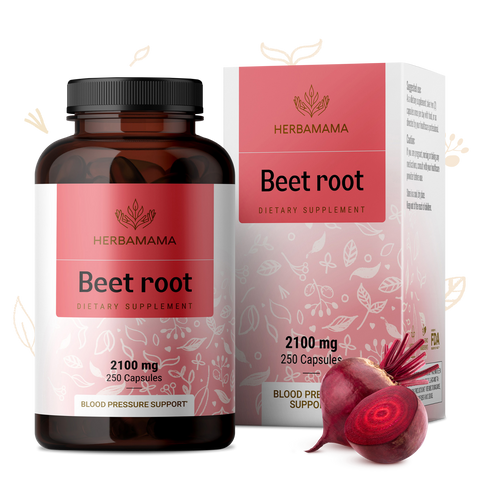Heart disease is a notorious silent killer, accounting for one in five deaths in the United States, and high blood pressure or hypertension is one of its chief instigators. But what if we told you that nature offers remedies in the form of herbs to support cardiovascular health and combat this issue? Today, we bring to your attention some incredible herbs that offer blood pressure support, potentially changing the way we approach this health challenge.
Want to dive deeper into the topic of cardiovascular health supplements? Do not miss out on our new video on the Herbamama YouTube channel, which provides detailed insights into the beneficial properties of these herbs.
Deciphering the Role of the Cardiovascular System and the Different Aspects of Blood Pressure
Understanding the Cardiovascular System: A River of Life
The cardiovascular system, often called the 'River of Life,' underpins our existence with its vital functions. It keeps our body ticking, our cells nourished, and our health in check. From supplying nutrients for our cells to flourish, aiding white blood cells to fend off infections, helping with the growth and development of the reproductive system, and ensuring waste removal, the cardiovascular system is fundamental to life.
We produce a significant amount of waste daily, which needs to be routed to the relevant organs for filtration and disposal. This system is also instrumental in maintaining our body temperature, ideally around 37 degrees Celsius, and striking a balance between the fluid in our blood and tissues. Additionally, it has a crucial role in the regulation of our blood pressure.
Unveiling the Types and Significance of Blood Pressure
Diving deeper into the topic of blood pressure, we need to recognize its two primary types: systolic and diastolic pressure. Systolic pressure measures the pressure when the heart contracts and pumps blood, while diastolic pressure measures the pressure when the heart rests between beats. Ideally, we want our blood pressure to measure around 120 over 80, as per the readings on a blood pressure cuff monitor.
Decoding Symptoms and Categories of Hypertension
However, when the reading consistently shows 140 over 90 or higher, it signifies hypertension, or high blood pressure. Dubbed as the 'silent killer,' hypertension is notorious for being asymptomatic; many people wouldn't even know if they have high blood pressure. This menacing condition is prevalent, affecting over 115 million diagnosed individuals in the United States, excluding the ones who might be unaware of their condition or are disregarding their symptoms.
Some symptoms are occasionally linked to high blood pressure, such as headaches, shortness of breath, dizziness, chest pains, nosebleeds, and visual disturbances. However, these symptoms can be misleading since they might be tied to other health conditions or deficiencies. For example, headaches could also be triggered by a magnesium deficiency, dehydration, or electrolyte imbalance.
Moreover, we can classify hypertension into two categories: primary and secondary hypertension. Primary, or essential hypertension, is when the cause is unknown, but factors like genetics and lifestyle could be influential. In contrast, secondary hypertension stems from an identifiable underlying medical condition, such as kidney infections or diabetes, or prolonged usage of certain medications. Given these complexities, regular blood pressure monitoring, particularly for individuals over the age of 40, becomes crucially important.
As we explore natural ways to reduce blood pressure, it's worth noting that there are numerous herbs for blood pressure and supplements for heart health available that can help manage hypertension and improve overall cardiovascular health.
Unveiling the Best Herbs for High Blood Pressure Support
The Power of Red: Dark-colored Berries and Cardiovascular Health
Interestingly, red-colored fruits, vegetables, and botanicals were frequently recommended for their myriad health benefits. Dark-colored berries, for instance, are loaded with flavonoids, contributing to their vibrant coloration. These flavonoids offer powerful antioxidant and anti-inflammatory benefits. The list of these super berries includes elderberries, tart cherries, Bilberries, blueberries, and blackberries. Their rich, dark hues are testament to their potential in nourishing our cardiovascular system.
Each of these berries has its unique merits. Elderberry is known for its effectiveness against common colds and flu, tart cherries are natural melatonin boosters aiding sleep, and bilberries are known for supporting blood pressure and vision. However, one berry that trumps the rest in the cardiovascular context is the Hawthorn berry. It has been extensively researched for its ability to increase the strength of our heart muscle, enhance oxygen uptake and utilization, improve circulation, and dilate blood vessels. As a natural high blood pressure supplement, it not only provides physical but emotional support too, often hailed for its healing properties for a broken heart and grief.
The Unmatched Potency of Hawthorn Berry for Heart Health
Hawthorn Berry can be consumed in various forms. I personally prefer steeping a teaspoon of the dried berries in hot water and drinking it like tea. It can also be taken in powdered form or as a tincture.
Unveiling Other Red Botanicals: Red Sage and Beetroot
Other red botanicals like red sage also exhibit similar cardiovascular benefits. This Chinese herb contains over 200 compounds acting as anti-inflammatory agents and antioxidants, thus nourishing our body.

Beetroot is another widely recognized botanical in this category. The same compounds that stain our hands when peeling beetroot are potent antioxidants benefiting our heart and circulatory system.

The Nutrient-Dense Green Herb: Stinging Nettle
Beyond these, there's stinging nettle, a green herb densely packed with vitamins, minerals, amino acids, antioxidants, and flavonoids. It stands out due to its iron content, instrumental in red blood cell production.

Incorporating Blood Pressure-Lowering Herbs into Daily Life
So, these herbs for lowering blood pressure are readily available in health food stores, and can be consumed in various forms. Their taste is pleasant, making them a great daily addition to your diet.
As you incorporate these heart health supplements into your lifestyle, remember that they are part of a holistic approach to managing blood pressure. Along with these natural supplements for high blood pressure, it's important to maintain a balanced diet, regular physical activity, and periodic medical check-ups. Exploring these best supplements for blood pressure is a rewarding journey towards achieving better cardiovascular health.
Exploring Circulatory Stimulant Herbs
Post lunch, our herbal adventure veered towards the realm of circulatory stimulant herbs. These herbs pique blood pressure and heart rate, subsequently enhancing focus. They have a profound neurological impact and aid in digestion. Circulatory stimulant herbs could be your secret weapon to combat post-meal sluggishness, providing a timely boost for both attention and digestion. We had the opportunity to sample an array of these stimulants, which included cayenne pepper, ephedra, rosemary, and ginkgo biloba. Interestingly, despite ginkgo's bitterness, it proved highly effective in aiding digestion. It stimulated salivation and triggered the release of digestive enzymes, enhancing the overall digestive process. These blood pressure support supplements truly delivered on their promise, enhancing our learning experience while promoting our health.
Harnessing Hypotensive Herbs for Blood Pressure Management
After an engaging dive into stimulatory herbs, our exploration of the herbal world steered us towards hypotensive herbs, a stark contrast to what we had previously sampled during lunch. These hypotensive herbs like lime flower and holy basil, are rich in flavonoids that help dilate the blood vessels, thus reducing blood pressure. Beetroot, laden with nitrates, induces the formation of nitric oxide, which facilitates the rapid delivery of nutrients and oxygen to the muscles and brain. This is why beetroot often finds its way into an athlete's meal during a workout.
Unlike certain medicinal herbs that drastically impact blood pressure, these hypotensive herbs exert a mild influence, which allows for daily consumption without any severe adverse effects. However, more potent herbs like mistletoe leaf, snake root, and greater periwinkle pack a stronger punch. They contain alkaloids that have a pronounced effect on blood pressure. Consequently, these stronger herbs require careful supervision, particularly if one has pre-existing heart or kidney conditions. Given the considerable influence of the kidneys on our blood pressure, caution is crucial.
The experiential exploration of circulatory stimulant and hypotensive herbs was indeed a memorable one. The consumption of the former led to a noticeable flush in our faces, evoking much amusement among us. On the other hand, the consumption of hypotensive herbs resulted in a dip in blood pressure, sparking a giddy feeling in most of us. This was an intriguing observation; watching people react in different ways, the laughter, the surprise reactions, made it a truly unforgettable experience.
What set this exploration apart was the personal, hands-on experience of tasting and smelling the herbs, observing their growth, and learning about their effects first-hand. The interaction was far more impactful and resonant than merely reading about these herbs in a book. It was this sense of personal connection, the unexpected reactions, and the vibrant discussion that underscored the true beauty of herbal studies. Every herb has its unique story, and it's incredible how each one can resonate with you differently. It was a fascinating journey to witness the art of balancing various herbs for health and wellness.
Unraveling the Calming Power of Nervine Herbs
In the winding down hours of the day, our herbal journey led us to explore the world of nervine, or calming herbs. 'Nervine' signifies calming, these herbs having an essential role in relaxing our nervous system. Common examples include lavender and passion flower, yet some herbs specifically target calming our cardiovascular system, like lemon balm and motherwort.
Lemon balm, owing to its essential oils, and motherwort, rich in alkaloids, possess notable calming qualities. They are known to dilate blood vessels, reduce tension in the smooth muscles surrounding the heart, and diminish anxiety. When stress kicks in, it's not uncommon for our heart rate to spike, and blood pressure to rise. In such instances, these two herbs shine by decreasing tachycardia, or fast heartbeat, and alleviating heart palpitations.

Motherwort often resonates with herbalists as a 'mother's hug,' owing to its calming effect on stress and its ability to soothe palpitations. Consuming motherwort can feel much like a comforting, relaxing hug, calming stress and easing worries about heart health. This tall-growing herb has indeed provided me with such soothing experiences in the past.

Lemon balm, on the other hand, delivers maximum benefits when fresh, as the essential oils are most potent in this state. The dried leaves lack the same concentration of these oils, making fresh lemon balm or its tincture a superior choice over dried herb tea.
When deciding between motherwort and lemon balm, it helps to consider their unique strengths. While motherwort is excellent for heart health, it also addresses menstrual cycle concerns, such as hot flushes. It is especially useful in managing palpitations. Lemon balm, conversely, has a more pronounced effect on the gut. If indigestion or bloating are causing high blood pressure or heart palpitations, lemon balm can help soothe the gut while also supporting the cardiovascular system.
Tasting and experiencing these herbs not only gave us a vivid understanding of their unique flavors but also fostered a sense of community in the class. The shared experiences, the exploration of these calming herbs, and the memories we created brought us closer together. Even today, when we connect on social media or meet during my visits to the UK, we often reminisce about these classes. This underscores the beauty of studying herbs in a group – it isn't just about the knowledge gained, but the lasting bonds formed and the shared experiences that resonate long after the lessons are over.
Embracing a Lifestyle for Optimal Blood Pressure Health
While certain botanicals offer substantial support to our cardiovascular system, it's undeniable that lifestyle choices significantly impact our heart health. From dietary habits to exercise routines, every decision forms part of the complex puzzle that determines our overall well-being.
Reducing Inflammation Through Diet
In considering a heart-healthy diet, the prime objective should be reducing inflammation. The main culprit triggering inflammation is, unsurprisingly, sugar. Despite being omnipresent in many foods, we often overlook its abundant presence. To give an example, a single beverage I recently picked up contained 30 grams of sugar, enough to exceed the daily recommended intake when combined with sugars from other sources. In addition to sugar, processed foods rich in trans fats, preservatives, artificial flavorings, and colorings also contribute to inflammation.
The Hidden Dangers of Sodium
Similarly, sodium intake needs careful monitoring. High sodium levels can cause our bodies to retain water, thereby raising blood pressure. Sodium is particularly abundant in canned items, especially soups. Regardless of whether it's table salt or sea salt, it's essential to stay mindful of your daily sodium intake.
Alcohol, Tobacco, and Caffeine: Effects on the Body
Substances like alcohol and tobacco, often used as de-stressors, unfortunately, induce negative inflammatory effects on various body systems. While they might offer a temporary sedative-relaxing effect, in the long run, they can harm our body. Likewise, caffeine, though not directly inflammatory, can impact heart and kidney function, hence it's important to monitor its intake, especially in people with heart or kidney conditions.
Potassium-Rich Foods for Heart Health
Turning our focus towards heart-healthy foods, potassium-rich foods like bananas, spinach, and avocados take the spotlight. They not only reduce the risk of heart disease but also balance sodium levels. This balance, along with the vessel-dilating ability of potassium, contributes to reduced blood pressure.
Fiber-dense foods, such as fruits, vegetables, and complex carbs like oats and quinoa, bind to sugars for a slower release. This process curtails any drastic impact on our cardiovascular system while aiding in blood sugar regulation. Healthy fats loaded with antioxidants, including Omega-3 fish oil and flaxseed oil, bring considerable benefits for the cardiovascular system.
Supporting the Gut: Fermented Foods
Fermented foods like kimchi and sauerkraut act as food for our beneficial gut bacteria. These bacteria produce short-chain fatty acids, some of which are distinctly anti-inflammatory. Thus, nurturing our gut microbiome can also help control inflammation levels in various organ systems.
Hydration and Heart Health
Moreover, staying well-hydrated is crucial. As 90% of our blood plasma is water, dehydration can alter our blood's viscosity, affecting heart function.
Exercise: A Vital Aspect of Cardiovascular Well-being
Besides diet, other lifestyle factors also contribute to heart health. Exercise is a notable one. Whether it's an intense gym workout, long-distance running, or even simple dancing, any activity that elevates heart rate can strengthen the heart muscles, promote better blood flow, and boost antioxidant enzyme production. Physical activity also triggers the release of neurochemicals like dopamine and GABA that help us de-stress.
Destressing Techniques for Heart Health
Other de-stressing techniques include yoga, meditation, and Qigong. Substituting an after-work alcoholic drink with a relaxing herbal tea can also be a healthier choice. Herbs like hops, passion flower, skullcap, and lemon balm can offer similar relaxing effects. These can be enjoyed hot or cold, depending on your preference.
Exploring the Herbal World for Relaxation
Remember, each individual might resonate with different herbs. For example, I turn to ashwagandha when stressed, while someone else might find more comfort in passion flower or hops. Therefore, don't hesitate to explore and discover the herbs that resonate most with you.
The Importance of Healthy Sleep Patterns
Lastly, healthy sleep patterns can't be overemphasized. A good night's sleep, about eight hours for most people, significantly contributes to overall health. Disturbances during sleep or inadequate rest can have a substantial negative impact on the following day and, cumulatively, on our health.
Embracing a lifestyle that supports healthy blood pressure isn't merely about making one or two changes. It's about a holistic approach, encompassing diet, physical activity, stress management, and sleep. Every small decision counts and contributes to the larger picture of cardiovascular health.
In Conclusion: Nurturing Your Heart Health Holistically
To summarize, managing blood pressure and supporting cardiovascular health is a multifaceted process involving a holistic approach. It is essential to balance our diets, limiting sugar, sodium, and harmful substances while increasing intake of heart-healthy foods like potassium-rich fruits, fiber-dense foods, healthy fats, and fermented foods. Regular exercise, de-stressing techniques, and adequate sleep form another significant part of the equation. Besides, several beneficial botanicals, especially the cardiotonic ones like Hawthorn Berry, provide notable support to our heart health. By following these comprehensive lifestyle modifications and incorporating nature's remedies, we can significantly boost our cardiovascular wellbeing.
Your Journey to Heart Health Starts Here
Start your journey towards better cardiovascular health today! We invite you to try our high-quality blood pressure supplements, renowned for their heart-supporting benefits. Visit our website now to explore our range of products and place your order. Join the community striving for holistic heart health!





